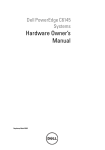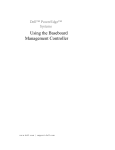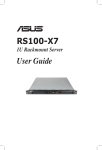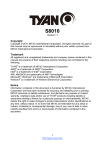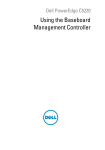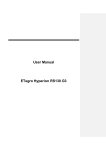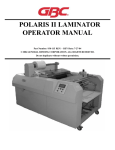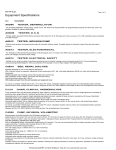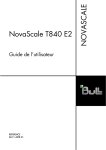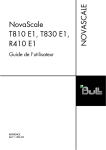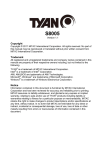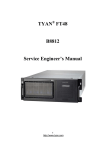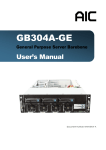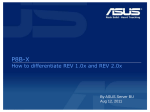Download Dell PowerEdge C6145 Reference Guide
Transcript
Dell PowerEdge C6145 Using the Baseboard Management Controller ___________ Information in this publication is subject to change without notice. © 2011 Dell Inc. All rights reserved. Reproduction of these materials in any manner whatsoever without the written permission of Dell Inc. is strictly forbidden. Trademarks used in this text: Dell™, the DELL logo, and PowerEdge™ are trademarks of Dell Inc. Microsoft® and Windows® are registered trademarks of Microsoft Corporation. Linux® is a registered trademark of Red Hat, Inc. in the United States and/or other countries. Other trademarks and trade names may be used in this publication to refer to either the entities claiming the marks and names or their products. Dell Inc. disclaims any proprietary interest in trademarks and trade names other than its own. June 2013 Rev. A01 Contents 1 Introduction ................................................................................5 BMC Key Features and Functions ............................................................5 2 Using the Web UI .......................................................................6 Logging in to the Web User Interface .......................................................6 Remote Management Controller GUI Explained .......................................8 Logout ......................................................................................................8 System Information...................................................................................8 Server Health .........................................................................................10 Configuration ..........................................................................................12 Remote Control ......................................................................................21 Maintenance ...........................................................................................32 3 Sensors Threshold ..................................................................37 Contents | 3 4 Events Table .............................................................................40 5 IPMI 1.5 / 2.0 Command Support List .....................................44 6 IPMI OEM Command List.........................................................52 Extended Configurations ........................................................................61 Appendix ......................................................................................71 SSH/Telnet Enable and Disable .............................................................71 SSH/Telnet Redirect Enable and Disable ...............................................72 VLAN ID .................................................................................................73 BMC/BIOS Version Info ..........................................................................74 Contents | 4 1 Introduction This section introduces the BMC and includes the requirements for web-based graphical user interface (GUI), keyboard, video, and mouse (KVM), and virtual media. BMC Key Features and Functions The following lists the supported features of the BMC: • Support for IPMI v1.5 and v2.0 • Out-of-band monitoring and control for sever management over LAN • Dedicated 10/100 NIC for remote management over a network • Information which includes main board part number, product name, manufacturer, and so on. • Health status/hardware monitoring report • View and clear events log. • Event notification using chassis LED indicator and Platform Event Trap (PET) • Platform Event Filtering (PEF) to take selected action for selected events, including NMI and SMI • Chassis management including power control and status report, front panel buttons, LED control, Secure Mode, and Boot Option • Watchdog and auto server re-start and recovery • Multi-session user and alert destination for LAN channel • IPMB connector to enable advanced server management communication with BMC • Support for APML v1.03 Introduction | 5 Using the Web UI 2 The BMC firmware features an embedded web server, enabling users to connect to the BMC using an Internet browser (Microsoft Internet Explorer) without needing to install KVM and virtual storage software on a remote console. Web-based GUI is supported on the following browsers: Microsoft Windows: • Internet Explorer 6 or later • Mozilla® Firefox® 2.0017 or later Linux: Mozilla Firefox 2.0017 or later NOTE: Before using the web user interface, ensure that the firewall settings are configured to enable access to the following ports: 7578 (KVM),USB-CDROM: 5120, USB-FLOPPY: 5123. Logging in to the Web User Interface Enter the BMC-embedded server IP address or URL into the address bar of the web browser. The BMC interface has a default of (DHCP\Static). Enter the system BIOS setup with <F2> to change these settings. When connecting to the BMC, the login screen prompts for the username and password. This authentication with Secure Sockets Layer (SSL) protection prevents unauthorized intruders from gaining access to the BMC web server. Once authentication is passed, you can manage the server by privilege. At the same time, the PHP Hypertext Preprocessor (PHP) records all user information, including user ID and privilege. Using the WEB UI | 6 Using Your Remote Management Controller: The Remote Management Controller has a user-friendly Graphics User Interface (GUI) called the Remote Management Controller GUI. It is designed to be easy to use. It has a low learning curve because it uses a standard Internet browser. Default User Name and Password When you first try to access your Remote Management Controller, you are prompted to enter a user name and password. Table 1-1 lists the user name and password for logging on to the Remote Management Controller. Table 2-1. BMC Default User Name and Password Field Default User Name Root Password Root NOTE: The default user name and password are in lower-case characters. NOTE: When you log in using the root user name and password, you have administrative powers. Change your root password after logging in for the first time. Using the WEB UI | 7 Remote Management Controller GUI Explained After you successfully log in to your Remote Management Controller, you are greeted with the Remote Management Controller GUI. Logout Log out from your Remote Management Controller The default timeout value is 30 seconds. System Information System Information Click the System Information tab to view the Remote Management Controller. The System Information tab enables you to view the System Power Status, firmware revision, aux firmware revision, and build time. Table 2-2. BMC Information BMC Information Description System Power Status On or Off Firmware Revision Remote Management Controller firmware revision. Aux Firmware Revision Remote Management Controller firmware aux revision. Build Time Date the firmware was last built in the form: MM DD YYYY HH:MM:SS Using the WEB UI | 8 List FRU The List FRU page shows a list of the detected Field Replaceable Units (FRUs) in the system. Select a FRU item from the drop down list to show more information. Chassis Information Lists the Type, Part Number and the Serial Number of the FRU. Board Information Lists the Manufacturer, Product Name, Serial Number and Part Number. Product Information Lists the Manufacturer Name, Product Name, Serial Number, Version, and Part Number. Using the WEB UI | 9 Server Health The Sensor menu provides information about system hardware such as the fan speed, internal temperature, and voltage. Sensor Readings & Sensor Readings with Thresholds It reads the sensor information the system. You can select a sensor type category. You can click “Refresh” to re-read the sensor state. And you can click “Show Thresholds” to show the thresholds of every sensor. Using the WEB UI | 10 Event Log The System Event Log (SEL) page displays system events that occur on the managed system. The SEL is generated by the Baseboard Management Controller (BMC) or BIOS on the managed system. The SEL lists the following information about system events: event ID, time stamp, sensor name, sensor type and a short description. Select Server Health in menu bar. Click Event Log to view specific event information. The list can be sorted by selecting any event log category. There are six categories, BMC Generated Events, BIOS Generated Events, SMI Handler, FCB Generated Events, System Management Software Events, and Unknown you can select. Subsequent selects Time Zone. There are two options, Local and GMT. Click Clear Event Log to Clear the SEL. Using the WEB UI | 11 Configuration Alerts When the BMC senses a platform event, such as an environmental warning or a component failure, an alert message can be sent to one or more email addresses. The Alerts window enables you to enter email addresses, IP addresses, and to activate the alerts for each address. To set up a destination to receive alerts, perform the following procedure 1 Click an Alert Number, click Modify. Using the WEB UI | 12 Using the WEB UI | 13 2 Select Alert Type, there are two options, Snmp Trap and Email. 3 Select Event Severity, The five options available are, Disable All, Informational, Warning, Critical and Non-recoverable. 4 If your Alert Type is Snmp Trap, type the destination IP. Using the WEB UI | 14 5 If your Alert Type is Email, enter the destination email address, and enter a brief description for the Subject of the email. 6 Click Save. Using the WEB UI | 15 Mouse mode It is an option to set up mouse mode which will using in KVM. Setting mouse mode depends on OS can get accurate mouse pointer. Absolute mode for host’s system is Windows OS Relative mode for host’s system is Linux OS. Network Show the Remote Management Controller IP address information. You can set DHCP or STATIC IP then click “Save”. Using the WEB UI | 16 SMTP Set E-mail (SMTP) server IP address for sending alert notification to user then click “Save”. Using the WEB UI | 17 Users The Users page enables you to view information and configure existing BMC users. You can control user who can login Remote Management Controller and accessing privileges. Table 1-28 displays the Users list for existing BMC users. Table 2-3. BMC User Information BMC Information Description User ID Displays a sequential user ID number. User Name Displays the login name of the user. Network Privilege Displays the group (privilege level) to which the user is assigned. (Administrator, Operator, User, Custom, or None). There are three operations in Users page: Add User, Modify User and Delete User. To add new user, click their user ID number, in the Users list. Click Add User. Using the WEB UI | 18 Enter user name, IPMI version, password, confirm password and network privileges, click Add. Using the WEB UI | 19 To change the settings for a user, click their user ID number, in the Users list. Click Modify User. Modify user name, IPMI version, password, confirm password and network privileges, click Modify. To delete new user, click their user ID number, in the Users list. Click Delete User. A dialog box appears, click yes to delete the user and automatically refresh page. NOTE: You must have Configure Users permission to configure a BMC user; otherwise these options are not available Using the WEB UI | 20 Remote Control Power Control This feature enables the administrator to power on, power off, power cycle, and reset the system remotely. Select Remote Control in menu bar. Click Power Control. Select a Power Control Operation. Table 1-4 list the power control operation; Table 2-4. Power Control Operation Options Power Control Operation Description Reset System Reboots system without powering off (warm boot). Power Off System – Immediate Powers off the system. Soft Shutdown – Orderly Shutdown Shuts down system. Power On System Powers on the system. Power Cycle System Powers off, then power on system (cold boot). Using the WEB UI | 21 Click Perform Action to enable the selected Power Control Operation. Console Redirection The Console Redirection page enables you to use the display, mouse, and keyboard on the local management station to control the corresponding devices on a remote managed system. You can run a maximum of four simultaneous console redirection sessions. NOTE: Before you can use the console redirection feature, your browser must have the Java runtime environment installed. This feature needs Java 1.5.15 or later installed on the host system. If the BMC detects that the Java Video Viewer is not installed, you are prompted to install it. NOTE: Sometimes the Console is referred to as the Session Viewer. NOTE: The recommended display resolution on the management station (or client) is at least 1280 x 1024 pixels at 60 Hz with 32 bit color. You cannot view the console in full screen mode if your monitor resolution is less than this minimum. The most powerful feature of your Remote Management Controller is the ability to redirect the host system’s console. To redirect the host system’s console is the ability to manage your host system as if it were physically in front of you, but not. Using the WEB UI | 22 Console Redirection Configuration Before you use Console Redirection, please check your Mouse mode. If the host’s OS is Linux, please change the Mouse mode to RELATIVE If the host’s OS is Windows, please change the Mouse mode to ABSOLUTE This menu item allows you to start a Remote Console session with the host system. 1 Click Console Redirection. Using the WEB UI | 23 2 Click Java Console. 3 And click Mouse item to Sync Cursor. Using the WEB UI | 24 BMC Virtual Media The Device menu allows you to virtualize a diskette image or drive. Virtual media enables a floppy image, floppy drive or CD/DVD drive on your system to be available on the managed system's console as if the floppy image or drive were present on the local system. The Device menu in KVM displays the floppy image, floppy drive, CD/DVD drive, or ISO image on the management console that is currently virtualized. NOTE: You must have Access Virtual Media permission to virtualize or disconnect a drive. NOTE: You can enable virtual media for one floppy/drive image and one CD/DVD drive/image. Only one drive/image for each media type can be virtualized at a time. A USB key/flash drive is treated as a floppy drive. Using the WEB UI | 25 Virtualizing Devices The Device client displays the list of devices available for mapping in the main window. To virtualize a device, select the checkbox in the Mapped column of the table. The device maps to the server at this point. To unmap, deselect the checkbox. And then select the image file with the dialog that is displayed. The image is added to the list of available devices. Mapping a Virtual Media Drive You can select a drive to become a virtual media drive by selecting the Mapped check box for a particular drive. CD/DVD Drives and ISO images are always read only which cannot be changed. Using the WEB UI | 26 Unmapping a Virtual Media Drive To unmap a virtual media drive, select the Mapped check box for a particular drive. Because some interaction might be going on with the drive, you must confirm the action before the drive is unmmapped. NOTE: The assigned virtual drive letter (Microsoft® Windows®) or device special file (Red Hat® Enterprise Linux®) may not be the same as the drive letter on this system (management console). Using the WEB UI | 27 BMC KVM The BMC KVM client main menu consists of five menu options, which are used to provide access to functions available through the viewer: Video, Keyboard, Mouse, Options, Device, and Help. To launch a KVM session, select Remote Control tag, click Console Redirection. Video Table 2-5. BMC KVM Video Menu Items Dropdown Menu Items Description Start Redirection This menu item can be used to begin Console Redirection. Stop Redirection This menu item can be used to halt Console Redirection. Restart This menu item can be used to stop Console Redirection and then start Console Redirection again. Full Screen This menu item can be used to view the Console Redirection in Full Screen mode. NOTE: Set your client system’s screen resolution to 1024 x 768 so that you can view the host system in true full screen. Exit Using the WEB UI Exit console redirection. | 28 Keyboard Table 2-6. BMC KVM Keyboard menu items Dropdown Menu Items Description Hold Right CTRL Key This menu item can be used to act as the rightside <CTRL> key when in Console Redirection. Hold Right ALT Key This menu item can be used to act as the rightside <ALT> key when in Console Redirection. Hold Left CTRL Key This menu item can be used to act as the leftside <CTRL> key when in Console Redirection. Hold Left ALT Key This menu item can be used to act as the leftside <ALT> key when in Console Redirection. Left Windows Key This menu item can be used to access the leftside <WINDOWS> key during a Console Redirection session. The following actions can be performed: Hold Down Press and Release Using the WEB UI | 29 Dropdown Menu Items Description Right Windows Key This menu item can be used to access the right-side <WINDOWS> key during a Console Redirection session. The following actions can be performed: Hold Down Press and Release ALT+CTRL+DEL This menu item can be used to act as if you depressed the <CTRL>, <ALT> and <DEL> keys down simultaneously on the host system that you are redirecting. Full Keyboard User can key-in function key. For example: Ctrl+C Mouse Sync Cursor for remote control mouse. Single Cursor: To solve problem of remote mouse can’t work correctly under LSI 8708EM2 WebBIOS. Using the WEB UI | 30 Options Bandwidth: Helps in regulated the network bandwidth. Video Settings: Helps in adjust video resolution. Device Table 2-7. BMC KVM Device Menu Items Dropdown Menu Items Description Redirect CDROM Enable you to start or stop the redirection of the CD-ROM drive. You can choose the CDROM drive from client computer. Using the WEB UI | 31 Dropdown Menu Items Description Redirect ISO Enable you to start or stop the redirection of the ISO. You can choose the CD IMAGE file from client computer. Redirect Floppy / USB Enable you to start or stop the redirection of the Floppy/USB drive. You can choose the Floppy/USB drive from client computer. Redirect Floppy Image Enable you to start or stop the redirection of the floppy drive. You can choose the Floppy IMAGE file from client computer. Maintenance Firmware Update Use the Firmware Update feature to upgrade to the latest firmware version. The following data is included in the BMC firmware package: • Compiled BMC firmware code and data • Web-based user interface, JPEG, and other user interface data files • Default configuration files NOTE: The firmware update retains the current BMC settings. Updating the BMC Firmware NOTE: Before beginning the firmware update, download the latest firmware version and save it on your local system. During the process of firmware update, the AC power of the managed system cannot be unplugged and the Web GUI cannot be closed. 1 Select “Maintenance” in menu bar. Click Enter Update Mode Using the WEB UI | 32 2 Browse to, or Type the path on your system where the firmware image file resides. Example: C:\<Product Name>\KCSFlash\<image_name> 3 Select the Update Type as Normal or Forced (The default value is Normal). Normal: An update operation will occur only when the BMC validates the target board, target product and version number. Forced: Forced update makes the BMC update the image without validating target board, target product and version number. 4 Click Upload Firmware. Using the WEB UI | 33 5 A window, telling that the firmware image has been verified, appears. Compare the uploaded image with existing device firmware version. 6 Select the Preserve Configuration or Don’t Preserve Configuration (The default value is Preserve Configuration). 7 Click Start Upgrade. Using the WEB UI | 34 The update might take several minutes. 8 The update is completed. Close the session and automatically log out. Using the WEB UI | 35 9 After the BMC resets, click Log In to log in to the BMC again. Using the WEB UI | 36 3 Sensors Threshold Table 3-1. Sensors Threshold Sensor Number Sensor Name The Converting Formula 01h FCB FAN1 Actual_Reading (RPM) = Raw_Data x 100 02h FCB FAN2 Actual_Reading (RPM) = Raw_Data x 100 03h FCB FAN3 Actual_Reading (RPM) = Raw_Data x 100 04h FCB FAN4 Actual_Reading (RPM) = Raw_Data x 100 Upper nonrecoverable Upper critical Upper noncritical Lower nonrecoverable Lower critical Lower noncritical 0x0F 0x00 0x0F 0x00 0x0F 0x00 0x0F 0x00 0xAF 0xB4 0xAE 0xB3 0xAD 0xB3 0x00 0x00 Fan Voltage 14h PS 12V 15h PS 5V 16h Standby 3.3V 17h PS 3.3V 18h PS 1.2V 0xFF 0xFF 0xFF 0xFF 0xFF 0xFF 0xFF 0xFF 0xFF 0xFF 0xFF 0xFF 0x00 0x00 0x00 0x00 Actual_Reading (Volts) = Raw_Data x 0.062 0xD8 0xD4 0xCF 0xAB Actual_Reading (Volts) = Raw_Data x 0.026 0xD7 0xD3 0xCD 0xA9 Actual_Reading (Volts) = Raw_Data x 0.0172 0xD6 0xD3 0xCD 0xA9 Actual_Reading (Volts) = Raw_Data x 0.026 0xFF 0xFF 0xFF 0x00 Actual_Reading (Volts) = Raw_Data x 0.0087 Sensors Threshold | 37 Sensor Number Sensor Name The Converting Formula Upper nonrecoverable Upper critical Upper noncritical Lower nonrecoverable Lower critical Lower noncritical 0x98 0x96 0x92 0x7D 0x7F 0x84 0x00 0x00 0x00 0x00 0x00 0x00 0x00 0x00 0x00 0x00 0x00 0x00 0x00 0x00 0x00 0x00 0x00 0x00 0x00 0x00 0x00 0x00 Actual_Reading (Volts) = Raw_Data x 0.0087 19h PS 1.1V 51h VCORE 1 Actual_Reading (Volts) = Raw_Data x 0.0083 52h VCORE 2 Actual_Reading (Volts) = Raw_Data x 0.0116 53h VCORE 3 Actual_Reading (Volts) = Raw_Data x 0.0083 54h VCORE 4 Actual_Reading (Volts) = Raw_Data x 0.0116 Temperature 0xFF 0xFF 0x64 0x62 0x70 0x6E 0x64 0x62 0x70 0x6E 0xFF 0x5F 0x6B 0x5F 0x6B 0x00 0x00 0x00 0x00 0x00 21h MLB TEMP 1 Actual_Reading (degrees C) = Raw_Data 22h MLB TEMP 2 Actual_Reading (degrees C) = Raw_Data 23h MLB TEMP 3 Actual_Reading (degrees C) = Raw_Data 24h MLB TEMP 4 Actual_Reading (degrees C) = Raw_Data 25h NB1_T EMP Actual_Reading (degrees C) = Raw_Data 26h NB2_T EMP Actual_Reading (degrees C) = Raw_Data Sensors Threshold 0x55 0x50 0x55 0x50 0x55 0x50 0x55 0x50 0x77 0x75 0x77 | 0x75 38 0x4B 0x4B 0x4B 0x4B 0x73 0x73 0x00 0x00 0x00 0x00 0x00 0x00 Sensor Number Sensor Name The Converting Formula 61h CPU1_ Temp Actual_Reading (℃) = Raw_Data 62h CPU2_ Temp Actual_Reading (℃) = Raw_Data 63h CPU3_ Temp Actual_Reading (℃) = Raw_Data 64h CPU4_ Temp Actual_Reading (℃) = Raw_Data FCB Ambien t1 Actual_Reading (degrees C) = Raw_Data (only support Sensor Reading, threshold unsupport) DIMM_ A1 to DIMM_ D8 Actual_Reading (℃) = Raw_Data A1h MB_12 V_Curr ent Actual_Reading = Raw_Data A3h PSU 1 POUT Actual_Reading = Raw_Data A4h PSU 2 POUT Actual_Reading = Raw_Data 2Ah E0h-FFh Upper nonrecoverable 0x4E 0x4E 0x4E 0x4E 0xFF 0x63 Upper critical 0x4C 0x4C 0x4C 0x4C 0x32 0x61 Upper noncritical 0x4B 0x4B 0x4B 0x4B 0x00 0x5F Lower nonrecoverable Lower critical Lower noncritical 0x00 0x00 0x00 0x00 0x00 0x00 0x00 0x00 0x00 0x00 0x00 0x00 0x00 0x00 0x00 0x00 0x00 0x00 0x00 0x00 0x00 0x00 0x00 0x00 0x00 0x00 0x00 Power Supply 0xFF 0xFF 0xFF 0xFF 0xFF 0xFF 0xFF 0xFF 0xFF Sensors Threshold | 39 4 Events Table Table 4-1. Threshold Sensors Event Sensor Number Sensor Name 01h FCB FAN1 02h FCB FAN2 03h FCB FAN3 04h FCB FAN4 21h MLB TEMP 1 22h MLB TEMP 2 23h MLB TEMP3 24h MLB TEMP4 25h NB1_TEMP 26h NB2_TEMP 61h CPU1_TEMP 01h 62h CPU2_TEMP (Temperature) 63h CPU3_TEMP 64h CPU4_TEMP E0h-E7h DIMM_A1-8 E8h-EFh DIMM_B1-8 F0h-F7h DIMM_C1-8 F8h-FFh DIMM_D1-8 Events Table | 40 Sensor Type Events Lower Critical – going low asserted 04h(Fan) Lower Critical – going low deasserted Upper Non-critical – going high asserted Upper Non-critical – going high deasserted Upper Critical – going high asserted Upper Critical – going high deasserted Upper Non-recoverable – going high asserted Upper Non-recoverable – going high deasserted Sensor Number Sensor Name Sensor Type Events Upper Critical – going high asserted 2Ah FCB Ambient1 01h (Temperature) Upper Critical – going high deasserted Upper Non-recoverable – going high asserted Upper Non-recoverable – going high deasserted Upper Non-critical – going high asserted 14h Upper Non-critical – going high deasserted PS 12V Upper Critical – going high asserted Upper Critical – going high deasserted 15h Upper Non-recoverable – going high asserted PS 5V 02h (Voltage) Upper Non-recoverable – going high deasserted Lower Non-critical – going low asserted Lower Non-critical – going low deasserted 16h STBY 3.3V Lower Critical – going low asserted Lower Critical – going low deasserted Lower Non-recoverable – going low asserted Lower Non-recoverable – going low deasserted Events Table | 41 Table 4-2. Non-threshold Sensors Event Table Sensor Number Sensor Name Sensor Type SensorSpecific Offset Events 71h PEF Action 12h O4h PEF Action 23h 00h Timer expired, status only 01h Hard Reset 02h Power Down 03h Power Cycle 08h Timer Interrupt 72h WatchDog2 74h AC Pwr On 09h 04h AC lost deasserted 73h ACPI Pwr State 22h 0Bh Legacy ON state 0Ch Legacy OFF state 07h 01h Thermal Trip 10h 02h Log Area Reset/Cleared 04h SEL Full 05h SEL Almost Full 04h PCI PERR 05h PCI SERR 00h Correctable ECC/other 41h CPU1Status 42h CPU2Status 43h CPU3Status 44h CPU4Status 40h SEL Fullness A5h 60h Events Table PCI Bus Memory | 42 13h 0Ch Sensor Number Sensor Name Sensor Type SensorSpecific Offset Events correctable memory error 01h Uncorrectable ECC/other uncorrectable memory error 05h Correctable ECC/other correctable memory error logging limit reached 75h Security 06h 05h Out-of-band Access Password Violation AAh PwrLimitAlert 07h 05h DCMI Power management exception action Events Table | 43 5 IPMI 1.5 / 2.0 Command Support List Table 5-1. IPMI Device Global Commands Command NetFn CMD O/M Supported Get Device ID App 01h M Yes Cold Reset App 02h O Yes Warm Reset App 03h O No Get Self Test Results App 04h M Yes Manufacture Test On App 05h O Yes Set ACPI Power State App 06h O Yes Get ACPI Power State App 07h O Yes Get Device GUID App 08h O Yes App 01h O No Broadcast Commands: Broadcast ‘Get Device ID’ Table 5-2. BMC Device and Messaging Commands Command NetFn CMD O/M Supported Set BMC Global Enables App 2Eh M Yes Get BMC Global Enables App 2Fh M Yes Clear Message Buffer Flags App 30h M Yes Get Message Buffer Flags App 31h M Yes Enable Message Channel Receive App 32h O Yes Get Message App 33h M Yes IPMI 1.5 / 2.0 Command Support List | 44 Command NetFn CMD O/M Supported Send Message App 34h M Yes Read Event Message Buffer App 35h O Yes Get BT Interface Capabilities App 36h O No Get System GUID App 37h O Yes Get Channel Authentication App 38h O Yes Get Session Challenge App 39h O Yes Activate Session Command App 3Ah O Yes Set Session Privilege Level Command App 3Bh O Yes Close Session App 3Ch O Yes Get Session Information App 3Dh O Yes Get Authentication Code Command App 3Fh O Yes Set Channel Access Commands App 40h O Yes Get Channel Access Commands App 41h O Yes Get Channel Info Command App 42h O Yes Set User Access Commands App 43h O Yes Get User Access Commands App 44h O Yes Set User Name Commands App 45h O Yes Get User Name Commands App 46h O Yes Set User Password Commands App 47h O Yes Active Payload Command App 48h O Yes Deactivate Payload Command App 49h O Yes Get Payload Activation Status App 4Ah O Yes Get Payload Instance Info Command App 4Bh O Yes Set User Payload Access App 4Ch O Yes Get User Payload Access App 4Eh O Yes Get Channel Payload Support App 4Fh O Yes Get Channel Payload Version App 50h O Yes Capabilities IPMI 1.5 / 2.0 Command Support List | 45 Command NetFn CMD O/M Supported Master Write-Read I2C App 52h M Yes Get Channel Cipher Suites App 54h O Yes Suspend/Resume Payload Encryption App 55h O Yes Set Channel Security Keys App 56h O Yes Get System Interface Capabilities App 57h O Yes Set System Info Parameters App 58h O Yes Get System Info Parameters App 59h O Yes Table 5-3. BMC Watchdog Timer Commands Command NetFn CMD O/M Supported Reset Watchdog Timer App 22h M Yes Set Watchdog Timer App 24h M Yes Get Watchdog Timer App 25h M Yes Table 5-4. Chassis Commands Command NetFn CMD O/M Supported Get Chassis Capabilities Chassis 00h M Yes Get Chassis Status Chassis 01h M Yes Chassis Control Chassis 02h M Yes Chassis Reset Chassis 03h O No Chassis Identify Chassis 04h O Yes Set Chassis Capabilities Chassis 05h O No Set Power Restore Policy Chassis 06h O Yes Get System Reset Cause (Note: RESTART CAUSE [3:0] AH= SOFT RESET (E.G. CTRL-ALTDEL) -UNSUPPORT. Chassis 07h O Yes IPMI 1.5 / 2.0 Command Support List | 46 Set System Boot Options (Note: Chassis 08h O Yes Get System Boot Options (Note: Chassis 09h O Yes Set Front Panel Button Enable Chassis 0Ah O No Set Power Cycle Interval Chassis 0Bh O Yes Get POH Counter Chassis 0Fh O Yes Command NetFn CMD O/M Supported Set Event Receiver S/E 00h O Yes Get Event Receiver S/E 01h O Yes Platform Event S/E 02h M Yes Command NetFn CMD O/M Supported Get SEL Info Storage 40h M Yes Get SEL Allocation Info Storage 41h O Yes Reserve SEL Storage 42h O Yes Get SEL Entry Storage 43h M Yes Add SEL Entry Storage 44h M Yes Partial Add SEL Entry Storage 45h O No Delete SEL Entry Storage 46h O Yes Clear SEL Storage 47h M Yes Get SEL Time Storage 48h M Yes Set SEL Time Storage 49h M Yes PARAMETER #5 DATA3 [6:5]FIRMWARE VERBOSITY - BIOS UNSUPPORT PARAMETER #7 UNSUPPORT PARAMETER #7 UNSUPPORT Table 5-5. Event Commands Table 5-6. SEL Commands IPMI 1.5 / 2.0 Command Support List | 47 Get Auxiliary Log Status Storage 5Ah O No Set Auxiliary Log Status Storage 5Bh O No Get SEL Time UTC Offset Storage 5Ch O Yes Set SEL Time UTC Offset Storage 5Dh O Yes NOTE: Support for Partial Add SEL is not required when Add SEL is supported. Table 5-7. SDR Repository Commands Command NetFn CMD O/M Supported Get SDR Repository Info Storage 20h M Yes Get SDR Repository Allocation Info Storage 21h O Yes Reserve SDR Repository Storage 22h M Yes Get SDR Storage 23h M Yes Add SDR Storage 24h M Yes Partial ADD SDR Storage 25h O Yes Delete SDR Storage 26h O No Clear SDR Repository Storage 27h M Yes Get SDR Repository Time Storage 28h O Yes Set SDR Repository Time Storage 29h O No Enter SDR Repository Update Mode Storage 2Ah O Yes Exit SDR Repository Update Mode Storage 2Bh O Yes Run Initialization Agent Storage 2Ch O Yes Table 5-8. FRU Inventory Device Commands Command NetFn CMD O/M Supported Get FRU Inventory Area Info Storage 10h M Yes Read FRU Inventory Data Storage 11h M Yes IPMI 1.5 / 2.0 Command Support List | 48 Write FRU Inventory Data Storage 12h M Yes IPMI 1.5 / 2.0 Command Support List | 49 Table 5-9. Sensory Device Commands Command NetFn CMD O/M Supported Get Device SDR Info S/E 20h M No Get Device SDR S/E 21h M No Reserve Device SDR Repository S/E 22h M No Get Sensor Reading Factors S/E 23h M Yes Set Sensor Hysteresis S/E 24h M Yes Get Sensor Hysteresis S/E 25h M Yes Set Sensor Threshold S/E 26h M Yes Get Sensor Threshold S/E 27h M Yes Set Sensor Event Enable S/E 28h M Yes Get Sensor Event Enable S/E 29h M Yes Re-arm Sensor Events S/E 2Ah M No Get Sensor Event Status S/E 2Bh M No Get Sensor Reading S/E 2Ch M Yes Set Sensor Type S/E 2Dh M Yes Get Sensor Type S/E 2Eh M No Set Sensor Reading and Event Status S/E 2Fh O No Set Sensor Reading and Event Status S/E 30h O Yes (Note: ONLY FOR FAN DEVICES.) Table 5-10. LAN Commands Command NetFn CMD O/M Supported Set LAN Configuration Parameters Transport 01h M Yes Transport 02h M Yes Suspend BMC ARP Transport 03h O Yes Get IP/UDP/RMCP Statistics Transport 04h O No (Note: Parameter 9 and 25 are not supported.) Get LAN Configuration Parameters (Note: Parameter 9 and 25 are not supported.) IPMI 1.5 / 2.0 Command Support List | 50 Table 5-11. PEF/PET Alerting Commands Command NetFn CMD O/M Supported Get PEF Capabilities S/E 10h M Yes Arm PEF Postpone Timer S/E 11h M Yes Set PEF Configuration Parameters S/E 12h M Yes Get PEF Configuration Parameters S/E 13h M Yes Set Last Processed Event ID S/E 14h M Yes Get Last Processed Event ID S/E 15h M Yes Alert Immediate S/E 16h O Yes PET Acknowledge S/E 17h O Yes Command NetFn CMD O/M Supported SOL Activating Transport 20h O Yes Set SOL Configuration Parameters S/E 21h O Yes Set SOL Configuration Parameters S/E 22h O Yes Table 5-12. SOL Commands IPMI 1.5 / 2.0 Command Support List | 51 IPMI OEM Command List 6 Table 6-1. OEM1 Commands (NetFn 30H, 31H) Command NetFN cmd Reserved Extended Configuration OEM1 01H Get Extended Configuration OEM1 02H Format Request: Response: Byte 1 – completion code Byte 2 - Reservation ID Request: Byte 1 - Reservation ID Byte 2 - Configuration ID Byte 3 - Attribute ID. 00h means read entire configuration data. Byte 4 - Index (used by table object only) Byte 5 - Data Offset – LSB Byte 6 - Data Offset – MSB Byte 7 - Bytes to read. FFh means read entire configuration or attribute. Response: Byte 1 – Completion code (01h:no more data) Byte 2 – Configuration ID Byte 3 – Attribute ID Byte 4 – Index (valid only for table object only) Byte 5 – Number of bytes returned, 1-based Byte 6~N – Data (Please check with table 1-25 Extended Configuration) IPMI OEM Command List | 52 Command NetFN cmd Set Extended Configuration OEM1 03H Format Request: Byte 1 - Reservation ID Byte 2 - Configuration ID Byte 3 - Attribute ID. 00h means read entire configuration data. Byte 4 - Index (used by table object only) Byte 5 - Data Offset – LSB Byte 6 - Data Offset – MSB Byte 7 - In progress [7:4] reserved [3:0] in progress 0 – in progress 1 – last configuration data being transferred in this request Byte 8~N – Data to be written. Response: Byte 1 – Completion code (01h:no more data) (Please check with table 1-25 Extended Configuration) IPMI OEM Command List | 53 Command NetFN cmd Restore to defaults OEM1 04H Format Request: Byte 1 -Configuration to be restored to defaults: [7:5] 111b= Restore the remaining parameters not included in below lists. 000b= Remaining parameters stay what it is. All other values are reserved [4] 1b= Restore PEFs to defaults [3] 1b= Restore serial configuration parameters to defaults [2] 1b= Restore SOL configuration parameters to defaults [1] 1b= Restore LAN configuration parameters to defaults [0] 1b= Restore user accounts to defaults Response: Byte 1 –Completion Code CCh = restore to one or more of the configuration not supported. Byte 2 – Task ID. Use the Task ID to get the restore status. The Task ID is automatically become invalid after 120 seconds when the restore requesting is completed. 00h reserved. IPMI OEM Command List | 54 Command NetFN cmd Get Restore Status OEM1 05H Format Request: Byte 1 – Task ID Task ID, the value returned by previous call to Restore to Defaults command. Response: Byte 1 –Completion Code Byte 2 –Default Restore Status: 00h: Restore in progress 01h: Restore completed SETSYSTEM OEM1 B3H GUID Request: Byte 1 ~16 – System GUID Response: Byte 1 – completion code Table 6-2. OEM2 Commands (NetFn 34H, 35h) Command NetFN cmd Format set web port number oem2 02H Request: Byte 1 – Https Port Number(Low Byte) Byte 2 – Https Port Number(High Byte) Byte 3 – Http Port Number(Low Byte) Byte 4 – Http Port Number(High Byte) Response: Byte 1 – completion code IPMI OEM Command List | 55 get web port number oem2 03H Request: Response: Byte 1 – completion code Byte 2 – Https Port Number(Low Byte) Byte 3 – Https Port Number(High Byte) Byte 4 – Http Port Number(Low Byte) Byte 5 – Http Port Number(High Byte) get board id oem2 11H Request: Response: Byte 1 – completion code Byte 2 – Board ID 01h ~ 04h Set asset tag OEM2 12h Request: Byte 1 - Length Byte 2~11 - Data (Max Set Asset Tag Length - 0x0A ) Response: Byte 1 - Completion Code Byte 2 - Count Written Set LAN Source OEM2 13h Request: Byte1 – LAN Source 00h – Shared NIC 01h – Dedicated NIC Response: Byte 1 – completion code Byte 2 – LAN Source Setting IPMI OEM Command List | 56 GET LAN SOURCE OEM2 14h Request: Response: Byte 1 – completion code Byte 2 – Current LAN Source 00h – Shared NIC 01h – Dedicated NIC GET FCB FW VERSION oem2 16H Request: Response: Byte 1 – completion code Byte 2 – FCB Fw Major number Byte 3 – FCB Fw Minor number SET FAN CONTROL oem2 61H Request: Byte 1 – Fan Control Setting [7] – Enabled/Disabled FAN Control 0: Disabled(Default) 1: Enabled [6:0] – Duty Cycle Setting. The rage is from 0 to 100, others are reserved. Response: Byte 1 – completion code GET FAN CONTROL oem2 62H Request: Response: Byte 1 – completion code Byte 2 – Fan Control Setting [7] – Enabled/Disabled FAN Control 0: Disabled(Default) 1: Enabled [6:0] – Duty Cycle Setting. The rage is from 0 to 100, others are reserved. IPMI OEM Command List | 57 SET FSC TABLE oem2 63H Request: Byte 1 – FSC Table Setting Byte 1 – completion code Byte 2 – FSC Table Setting [7] – Enabled/Disabled FAN Table 0h: Disabled (Default) 1h: Enabled [6:0] – Fan Table Setting(0-based) 80h: 1st FSC fan table (default: 13800RPM) 81h: 2nd FSC fan table (FACEBOOK) 82h: 3rd FSC fan table (Oscillation) 83h: 4th FSC fan table (Western Geco) 84h: 5th FSC fan table (Loki) Response: Byte 1 – completion code GET FSC TABLE oem2 64H Request: Response: Byte 1 – completion code Byte 2 – FSC Table Setting [7] – Enabled/Disabled FAN Table 0h: Disabled (Default) 1h: Enabled [6:0] – Fan Table Setting(0-based) 80h: 1st FSC fan table (default: 138RPM) 81h: 2nd FSC fan table (FACEBOOK) 82h: 3rd FSC fan table (Oscillation) 83h: 4th FSC fan table (Western Geco) 84h: 5th FSC fan table (Loki) IPMI OEM Command List | 58 GET FCB SKU INFO oem2 6aH Request: Response: Byte 1 – completion code Byte 2 – FCB SKU Information GET FCB POWER THROTTLING STATUS oem2 6bH Request: Response: Byte 1 – completion code Byte 2 – FCB Power Throttling status OEM GET PIC MODEL oem2 70H Request: Response: Byte 1 – completion code Byte 2 – PIC model 10h - PIC16 12h – PIC18 Get PSU Mismatch and type OEM2 B3H Request: Response: Byte 1 – completion code Byte 2 – PSU mismatch 00h – Mismatch 01h – Match Byte 3 – PSU type [7:4] PSU2 type 01h – 470 Watt 02h – 750 Watt 03h – 1100 Watt 04h – 1400 Watt [3:0] PSU1 type 01h – 470 Watt 02h – 750 Watt 03h – 1100 Watt 04h – 1400 Watt IPMI OEM Command List | 59 Table 6-3. OEM3 Commands (NetFn 2EH, 2Fh) Command NetFN cmd Format OemGetBMCSK Oem3 U 75H Request: Response: Byte 1 – completion code Byte 2 - BMC SKU 00h AST2050 01h AST1100 IPMI OEM Command List | 60 Extended Configurations Table 6-4. Extended configurations Extended Configurations All strings are in P-String format. Configuration ID = 02h, NIC Attribute ID Size Description NicSelection 1 1 Specifies the current mode of operation for the BMC network interface. 0: Shared NIC (default) 1: Dedicated NIC SharedNICSelection 2 1 R/W This parameter is only valid when Attribute ID 1 NICSelection parameter is set to 0h as Shared NIC. 0h: Reserved (Recommend to set to 0h when NICSelection is set to Dedicated NIC.) 1h: NIC-1 (default) 2h: NIC-2 3h: NIC-3 R/W 4h: NIC-4 Note: According to DCS I/O guide line, RJ45 connectors should be labeled starting from NIC-1. It also requires that Dedicated BMC NIC should always be the largest number (last port number). Therefore this Attribute ID parameter only requires to support the available Shared NIC numbers according to the labeled numbers, regardless of the NC-SI topology (i.e. Single Channel Dual Package IPMI OEM Command List | 61 or Dual Channel Single Package). When user attempts to set to a NIC value that is not supported on the platform, a completion code CCh should be returned to indicate an invalid data. Configuration ID = 03h, SOL Attribute ID Size Description SOL Idle Timeout 1 2 byte1:2 - Define the inactivity timeout in minutes, 1-based, LSByte first. This parameter only applies to the IPMI over LAN session with SOL payload activated. 0h= session does not timeout and close due to inactivity. Default = 01h R/W 0: Disabled (default) 1: Enabled R/W Telnet/SSH Redirect Enable 2 1 Attribute ID Size Description Service Disabled 1 1 Disable or enable services. This attribute takes precedence over the individual feature enabled/disabled. Once one service has been disabled, the BMC must not allow user to enable the corresponding feature and D5h completion code must be returned. For example, if HTTP/HTTPS is disabled, user must not abe able to enable the Web Server through Web Server Configuration ID = 04h, Security IPMI OEM Command List | 62 R/W Configuration (Configuration ID 0Ch). In other words, Web can only be disabled or enabled when HTTP/HTTPS is enabled. [0] - all services except IPMI are disabled. This bit takes precedence over other bits. Default is 0. [1] - KVM/Virtual Storage, enabled by default. [2] - HTTP/HTTPS, enabled by default. [3] - SSH/Telnet, disabled by default. Max Authentication Failures 2 1 Specifies the maximum number of allowed authentication failures. Setting this value to 0 will disable the lockout feature. Whenever this setting is modified, the number of authentication failure of each enabled user must be reset to 0. When an account Is locked out, the IPMI Messaging must be disabled on the LAN channel. See Get User Access command. R/W Default = 00h (disable Lockout feature) Lockout Window 3 2 Specifies the window, in second, during which if the consecutive maximum number of authentication failures is reached, the account should be disabled. Setting this value to 0 will disable the lockout feature. R/W IPMI OEM Command List | 63 Whenever this setting is modified, the number of authentication failure of each enabled user must be reset to 0. Default setting is 180 seconds. Lockout Time 4 2 Specifies the time period an account should be disabled if the maximum number of authentication failures is reached. The unit is seconds. Setting this value to 0 will disable the lockout feature. Whenever this setting is modified, the number of authentication failures of each enabled user must be reset to 0. R/W Default value is 3600 (1 hour). Configuration ID = 05h, Account Status Attribute ID Size Description Number of User 1 1 Number of users created, including enabled and disabled users. The count Does not include USER ID1. Number of Enabled User 2 1 Number of enabled users. User Name 3 1..17 Specify the user name in PString format. Indexed by user ID. IPMI OEM Command List | 64 R R R I Account Status 4 1 Configuration ID = 06h, DNS Status of the account. This is the supplement to the byte 3 of response data of Get User Access command. Indexed by user ID. 00h = status is unspecified 01h = user ID is enabled via Set User Password 02h = user ID is disabled via Set User Password 03h = user ID is lockout R Attribute ID Size Description DNS Dhcp Enable 1 1 Specifies that the DNS server IP addresses should be assigned from the DHCP server. 0: FALSE (default) 1: TRUE. R/W Specifies the IP address for DNS server 1. This parameter is read-only if DNS Dhcp Enable and DHCP are enabled. R/W Specifies the IP address for DNS server 2. This parameter is read-only if DNS Dhcp Enable and DHCP are enabled. R/W Enables registering the BMC host name on the DNS server 0: FALSE (default) 1: TRUE. R/W Specifies the DNS BMC host name. This parameter is read-only if DNS Register BMC is set to TRUE. At least one R/W DNS Server1 DNS Server2 DNS Register BMC DNS BMC Host Name 2 3 4 5 4 4 1 1..64 IPMI OEM Command List I | 65 character must be alphabetic. The default name is bmcservice_tag, where service_tag is the service tag number of the Dell server. For example: bmcXG3487A. DNS Domain Name Dhcp Enable DNS Domain Name 6 7 1 1.256 Specifies that the DNS domain name should be assigned from the DHCP server. 0: FALSE (default) 1: TRUE. R/W The DNS domain name string. This parameter is read-only if DNS Domain Name Dhcp Enable is set to TRUE. Characters are restricted to alphanumeric, '-' and '.'. Default is “” R/W Configuration ID = 0Ch, WEB Server Configuration Attribute ID Size Description Web Server Enabled 1 1 Disable or enable the BMC Web server. 0: FALSE 1: TRUE (default) R/W Max Web Sessions 2 The maximum number of simultaneous sessions allowed for this system. This field is READ-ONLY. R The number of current session for GUI on the system. This field is READ-ONLY. R The WEB communication idle timeout, in seconds. R/W 1 Active Web Sessions 3 1 Web Server Timeout 4 4 IPMI OEM Command List | 66 Timeout range is 60 to 1920 seconds. A 0 specifies disabling the timeout feature. The default is 300. HTTP Port Num HTTPS Port Num 5 6 2 2 Specifies the port number to use for HTTP communication with the BMC. Default is 80. R/W Specifies the port number to use for HTTPS communication with the BMC. Default is 443. R/W Configuration ID = 0Eh, Firmware Log, indexed object Attribute ID Size Description Entity 1 1 Refer to Firmware Information configuration. R Firmware Version 2 1..16 Refer to Firmware Information configuration. R Branch 3 1..16 Refer to Firmware Information configuration. R Build Information 4 1..16 Refer to Firmware Information configuration. R Update Date / Time 5 3 Number of minutes from 0:00 hrs 1/1/08. LSbyte first (little endian) R Configuration ID = 0Fh, Firmware Information, indexed object Attribute ID Size Description Name 1 1..16 Specifies BMC model name, such as AST2050. R Description 2 1..256 A text description of the type controller. R IPMI OEM Command List | 67 Entity Product Info Firmware Version 3 4 5 1 1..64 1..16 Specifies the physical controller the image is associated with. 0: BMC 1: SYSTEM (BIOS) 2: PDB 3: FCB R A text string that identifies the product. "Dell DCS Remote Management Controller" (default) R A string containing the BMC firmware version. The firmware version is reading from IPMI Get Device ID command. The format of BMC FW Version string is "<major>.<minor>", where major is one character and minor is two characters. R Branch 6 1..16 A string containing the firmware branch information. R Build Information 7 1..16 A string containing the firmware build number information. The string format is YYMMDD. R This attribute enables user to customize various BMC settings and store as user default. It also allows user to erase current settings and restore back to previously set user default settings. User default settings include all write-able settings in Extended Configuration Parameters, IPMI User Account W User Default Setting IPMI OEM Command List 8 | 1 68 Settings, and IPMI LAN Configuration Parameters. 0h – Set as User Default 1h – Restore User Default Configuration ID = 10h, Firmware Update Attribute ID Size Description Remote Update Enable 1 1 Allow firmware update via TFTP server. R/W Protocol 2 1 Specified supported protocols. [7:3] - reserved [2] HTTP [1] FTP [0] TFTP R URI 3 1..256 The URI of the image file. R/W Connection Retry 4 1 Specify the number of retries for connecting to TFTP server. A zero value means the BMC does not attempt to retry connect to TFTP server. R/W Retry Interval 5 1 Define the retry interval in 5 seconds increaments. R/W Delay Time 6 1 Define the delay time for connecting to TFTP server. The time is specified in seconds. 00h: BMC connects to TFTP server immediately. FFh: random between 5 and 10 seconds. R/W IPMI OEM Command List | 69 Configuration ID = 11h, Power Management Attribute ID Size Description Power Management Enable 1 1 Specify the use of power management method. Bit 7: Enable DPNM power management 1b = enable DPNM 0b = disable DPNM Bit 6:0: reserved R/W Power Staggering AC Recovery 2 This parameter is only effective if the Power Policy is not set to always off. 0x00 : Immediate Power On (No Delay) : Default 0x01 : Auto (Random), the auto generated delay time must be in the range of Minimum Power On Delay and Maximum Power On Delay. 0x02 : User Defined, the user defined delay time must be in the range of Minimum Power On Delay and Maximum Power On Delay. R/W 1 Power On Delay 3 2 Defines the time to delay power on the system after AC recovered. R/W Minimum Power On Delay 4 2 Specifies the minimum power on delay time when AC is restored. This should not be less than the time BMC startup time. R Maximum Power On Delay 5 Specifies the maximum power on delay time when AC is restored. The number must large than Minimum Power On Delay. R/W IPMI OEM Command List 2 | 70 Appendix SSH/Telnet Enable and Disable 1 Reserved Extended Configuration (NetFn: 30H CMD:01H) 2 Set/Get Extended Configuration(NetFn: 30H CMD:03H/02H) Configuration ID = 04h, Security Attribute ID Size Description Service Disabled 1 1 Disables or enables services. This attribute takes precedence over the individual feature enabled/disabled. Once one service has been disabled, the BMC must not allow users to enable the corresponding feature and D5h completion code must be returned. For example, if HTTP/HTTPS is disabled, user must not be able to enable the Web Server through Web Server Configuration (Configuration ID 0Ch). In other words, Web can only be disabled or enabled when HTTP/HTTPS is enabled. Example: R/W [0] - all services except IPMI are disabled. This bit takes precedence over other bits. Default is 0. [1] - KVM/Virtual Storage, enabled by default. [2] - HTTP/HTTPS, enabled by default. [3] - SSH/Telnet, disabled by default. Get SSH/Telnet enable status: 1 Reserved Extended Configuration ipmitool raw 0x30 0x01 Response: 0x01 (Reservation ID) Appendix | 71 2 Get Extended Configuration ipmitool raw 0x30 0x02 0x01 0x04 0x01 0x00 0x00 0x00 0xFF Response: 0x04 0x01 0x00 0x01 0x08 (SSH/Telnet disabled) Set SSH/Telnet Enable: 1 Reserved Extended Configuration ipmitool raw 0x30 0x01 Response: 0x02 (Reservation ID) 2 Enable SSH/Telnet ipmitool raw 0x30 0x03 0x02 0x04 0x01 0x00 0x00 0x00 0x01 0x00 (set SSH/Telnet enable) Response: 0x01 SSH/Telnet Redirect Enable and Disable 1 Reserved Extended Configuration (NetFn: 30H CMD:01H) 2 Set/Get Extended Configuration(NetFn: 30H CMD:03H/02H) Configuration ID = 03h, SOL Attribute ID Size Description Telnet/SSH Redirect Enable 2 1 0: Disabled (default) 1: Enabled R/W Example: Get SSH/Telnet Redirect enable status: 1 Reserved Extended Configuration ipmitool raw 0x30 0x01 Response: 0x01 (Reservation ID) 2 Get Extended Configuration Ipmitool raw 0x30 0x02 0x01 0x03 0x02 0x00 0x00 0x00 0xFF Response: 0x03 0x02 0x00 0x01 0x00 (SSH/Telnet SOL redirect disabled) Appendix 72 Set SSH/Telnet SOL Redirect enable: 1 Reserved Extended Configuration ipmitool raw 0x30 0x01 Response: 0x02 (Reservation ID) 2 Enable SSH/Telnet SOL redirect. ipmitool raw 0x30 0x03 0x02 0x03 0x02 0x00 0x00 0x00 0x01 0x01 (set 1 to enable) Response: 0x01 VLAN ID User can use LAN configuration command parameter 14H to Set or Get VLAN ID. More VLAN information, please refer to “IPMI SPEC v2.0 errata revision 4”. Commands NetFn CMD O/M Supported Set LAN Configuration Parameters Transport 01h M Yes Transport 02h M Yes (Note: Parameter 9 and 25 are not supported.) Get LAN Configuration Parameters (Note: Parameter 9 and 25 are not supported.) LAN configuration Parameter 14H: Parameter # Parameter Data 802.1q VLAN ID (12-bit) 14H data 1 [7:0] - Least significant 8-bits of the VLAN ID. 00h if VLAN ID not used. data 2 [7] - VLAN ID enable. 0b = disabled, 1b = enabled. If enabled, the BMC will only accept packets for this channel if they have 802.1q fields and their Appendix | 73 VLAN ID matches the VLAN ID value given in this parameter. [6:4] - reserved [3:0] - most significant four bits of the VLAN ID Example: 1 Get LAN Configuration Parameter command: ipmitool raw 0xC0 0x02 0x01 0x14 0x00 0x00 Response: 0x00 0x11 0x01 0x80 (VLAN Enable and VLAN ID: 1) 2 Set LAN Configuration Parameter command: ipmitool raw 0xC0 0x01 0x01 0x14 0x01 0x80 Response: 0x00 BMC/BIOS Version Info BMC Version Info Get Device ID command can get BMC version Info in response date byte4, 5. More detail about this command please refers to “IPMI SPEC v2.0 errata revision 4” chapter 20.1. Response Date Data field Byte 1 Completion Code Byte 2 Device ID. Byte 3 Device Revision [7] 1 = device provides Device SDRs 0 = device does not provide Device SDRs [6:4] reserved. Return as 0. [3:0] Device Revision, binary encoded. Appendix 74 Byte 4 Firmware Revision 1 [7] Device available: 0=normal operation, 1= device firmware, SDR Repository update or self-initialization in progress. [Firmware / SDR Repository updates can be differentiated by issuing a Get SDR command and checking the completion code.] [6:0] Major Firmware Revision, binary encoded. Byte 5 Firmware Revision 2: Minor Firmware Revision. BCD encoded. … … Example: Get Device ID command: Ipmitool raw 0x06 0x01 Response: 0x00 0x25 0x01 0x01 0x00 0x02 0xbf 0xa9 0x19 0x00 0x3b 0x00 0x6e 0x6d 0x00 0x00 Appendix | 75 BIOS version Info The BIOS enables the system interface to the BMC and logs this event to the BMC early in POST. User can find the BIOS version in event record byte 15-16 as following table: POST START Event Byte Item Data 1-2 Record ID - 3 Record Type - 4-7 Timestamp - 8-9 Generator ID 0x01 (BIOS) 10 Event Message Format Version 0x04 (IPMI 1.5) 11 Sensor Type 0xC1 (OEM Reserved) 12 Sensor Number 0x81 (BIOS Start) 13 Event Direction/Event Type 0x70 (OEM) 14 Event Data 1 0xA0 15 Event Data 2 0x01 (BIOS Major Version) 16 Event Data 3 0x01 (BIOS Minor Version) Example: 1 Issue SEL list command to find post start Entity ID is 9 2 ipmitool sel get 9 BIOS version is V 1.1 Appendix 76














































































